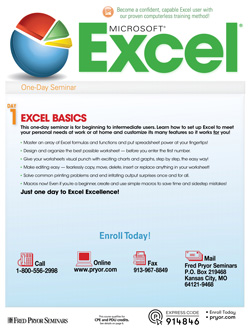How to successfully orchestrate the people, resources and tasks it takes to bring any project in on time and within budget
Project managers wear more hats than almost anyone. They're planners, schedulers, and big-picture thinkers. Project managers must be team builders, coaches, and motivators. They need to know how to negotiate for more time, more resources, and fewer changes. They've got to be smart risk takers, turn-on-a-dime decision makers, and communicators extraordinaire.
This two-day workshop is the most practical and comprehensive introduction to the many facets of project management you'll find anywhere.
As a participant, you will get a thorough briefing in the nuts and bolts of planning, scheduling, and budgeting. You'll discover the communication skills it takes to get ideas, instructions, and requests across quickly and accurately. You will learn how to stay on top of deadlines and expenses, ways to rebound quickly from surprises and setbacks, and how to get the best from people who don't normally report to you.
Everyone who attends this workshop will come away in a strong position to lead any project with confidence and discipline — from drawing board to finished product.
This is multidiscipline training that will make you a better all-around project manager …
- Learn the imperative questions to ask before you even begin — get the information that will make certain you key in on what is expected, by when, and at what cost
- Practice using the planning and scheduling tools that professional project managers use (GANTT charts, the critical path method, work breakdown structures, project management software, and others)
- Discover the best places to find the people you'll need, how to articulate the kind of skills, attitudes, and work habits you're looking for, and ways to pry the people you want from their own work, maybe even from a reluctant boss
- Implement the controls and safety nets you need to establish early on: learn how to set (and meet) milestones, gain confidence to negotiate for new deadlines if necessary, motivate a team that's losing interest, and determine what to do when plans change midstream — or when the "Murphy factor" hits your project in a big way
Who will benefit most?
- Self-taught project managers seeking formal training and new skills
- Project teams having trouble juggling their tasks and responsibilities
- People with limited experience in spearheading a project
- Anyone about to step into a project manager role for the first time

How to successfully orchestrate the people, resources and tasks it takes to bring any project in on time and within budget
Good project managers are becoming central figures in the quest to stay competitive. This course provides both the depth and breadth of instruction that will help you become a disciplined, well-organized and highly effective project manager.You will receive two days of total immersion in all the skills you need to manage a project successfully from beginning to end.
Download BrochureHow to begin every project with your eyes wide open
- Goals? Objectives? Desired outcomes? How to determine precisely what your project is expected to accomplish
- An 11-point checklist to make sure you and the project sponsor are on the same page right from the beginning
- Questions to ask that will bring any and all constraints — involving money, performance and deadlines — to the surface early on
- How to avoid the “flat forehead syndrome” using team brainstorming to identify all required tasks well in advance
- What work truly deserves “project status” — the pros and cons of project management
- Team and individual assessment: Do you have the right people, with the right skills, to do the job? Are you the right person to be leading this project?
Making the effort up front to get your arms around a project will save you time, money and aggravation down the road. You’ll see why this preliminary defining step is the cornerstone on which any successful project will rest.
The planning it takes to pull off a glitch-free project
- Work breakdown structure — what it is, how it works and ways to use it to consolidate and prioritize tasks
- Exercise: Develop an actual work breakdown structure
- How to determine the time it takes to do a task — a nearly foolproof formula to help you arrive at a realistic time frame
- GANTT charts and critical paths: two scheduling tools to help you spot potential conflicts and fine-tune your timing
- Seven steps to create a budget that’s realistic, manageable and flexible
- Risk management: how to build in time and money cushions to soften the blow of unexpected developments
- What to look for when you put together your “on loan” project team: personality traits and skill sets to weigh, how to get recruits (and their own managers) to say yes, clarifying roles up front
Almost any project is full of mistakes just waiting to happen. But with foresight — and a good grasp of proven management tools — it’s possible to circumvent most of the pitfalls that can derail a poorly planned project.
How to set your project in motion
- Put it in writing? Call a meeting? Send an email? Set up a oneon- one? Your communication options and when to use each
- An eight-point checklist for productive team meetings
- When you have bad news — ways to soften the blow without sugarcoating the facts
- Exercise: What to do when you’re hit with something unexpected that could wreak havoc with your progress — How do you, as project manager, respond effectively to surprises or out-of-the-blue changes?
- Ways to develop a balanced team — how diversity can add to innovation and lessen the dangers of groupthink
You know where you’re going. You’ve mapped out a plan. Now the challenge is to get your project up and running — and keep it in high gear. What will it take to implement your plans? Your job description just grew to include effective communicator, shrewd negotiator and powerful motivator.
Why you need to keep a close watch on your project’s progress and how to do it
- Planned vs. actual — how a GANTT chart can alert you to any serious deviations from plan
- The importance of meeting milestones and the domino effect of missing them by even a little
- Minding the money — how to cope with cost overruns and ways to minimize their effect
- Excuses and blaming, habitual lateness, paralysis of analysis and other red flags indicating your project may be heading for trouble
- “Crashing” a project: what it means, when to do it and how to predict its outcome
- Lessons in project problemsolving: specific steps to take when ...
- Shoddy work or mistakes repeatedly undermine progress
- Work overload threatens team burnout
- Once-reasonable deadlines become impossible to meet
- Time and money are suddenly in short supply
Early successes can easily foster a false sense of security. If you’re not continually monitoring key indicators — deadlines, costs, milestones, adherence to plan — you may be setting up your project (and yourself!) for a major setback. The tools and techniques you’ll learn here will help you keep your finger on the pulse of your project at all times.
Closing up shop — how to deliver your completed project
- How to decide whether your project has met all the objectives — key questions to ask yourself before making final delivery
- An eight-point checklist to help ensure you’ve covered all the bases, including:
- Settlement of all project related Bills
- Timely, orderly release of borrowed team members, paid consultants and internal advisers
- Writing the end-of project
- Report
- Disposition of project materials, supplies and spare parts
- Abandoned projects: the salvage value to look for if, for some reason, your project gets scrapped midstream or shelved upon completion
After all you’ve been through — laying the groundwork, doing the planning, implementing it all and constantly checking your progress — wrapping up a project seems almost anticlimactic. But there’s still important work to be done, and this session walks you through the close-out phase of your project.
Critiquing your performance and celebrating your success!
- What went right — and why? What went wrong — and how would you do things differently? Any lessons to share with your successors? Any insights your client might appreciate? You’ll learn ways to evaluate your team’s performance so you can leverage your experiences for the next project
- Keeping the project spirit alive within your organization by celebrating your success: You’ll come away with a wealth of ideas to reward team members, acknowledge your project’scontribution (to your organization, perhaps even to your industry) and create the kind of goodwill that makes people want to be a part of your next project team
Before you put your project to bed — and while everything is still fresh in your mind — you need to look back and learn from the past.


